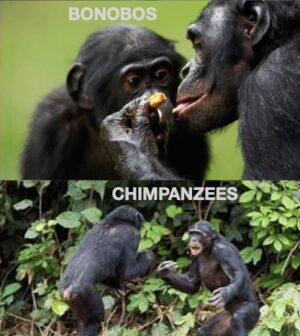- Belgium comes to Yamashita Park
- Residential Villa in Phuket Entices Remote Workers With Long-Stay Rates
- Rare pieces of French glass art at the Mirai Museum of Art
- Feast on fresh fish and seafood at the 2024 ‘Sakana’ Festival
- Would you like to ride in a Louis Vuitton gondola lift?
- Naked Snow Aquarium
- Festive lights at Yomiuriland will get you feeling the holiday vibes
Study finds aggressive bonobos have more mating success than chimpanzees

In studying the evolution of human aggression, researchers at Boston University looked to two of humankind’s primate relatives: the bonobos (Pan paniscus) and chimpanzees (Pan troglodytes) for answers.
Bonobos were once thought to be from the same species as chimpanzees. Although they are closely related, a body of research proves they were a different species with different society structure. Appearance and DNA-wise, there is not much difference between the two species. Chimpanzees and bonobos share approximately 99.6% of their DNA but exhibit different behaviors.
Experiments at Lola ya Bonobo sanctuary in the Democratic Republic of the Congo show bonobos have an altruistic side. They are willing to help strangers with food even though they get little or none of it for themselves.
Despite the human cooperative behaviour of bonobos, a new study recently published in Current Biology reveals that male bonobos fight each other more frequently than male chimps do — and are far more successful in mating than their chimp counterparts.
Maud Mouginot, Lead Researcher and Postdoctoral Associate at Boston University, decided to find out more about aggression among bonobos after a previous research revealed that there exists a degree of reproductive bias among male – some having more offspring than others.
“So the question was, if bonobos are not that aggressive, how can they have such a high reproductive skew?” she asked.
Since their recognition as a species distinct from chimpanzees, bonobos have been romanticized for their free-spirited nature.
Their reputation as peaceful primates comes from how they use copulation as a means to resolve conflicts and often have same gender couplings, especially among females.
Mouginot and her colleagues focused on three communities at the Kokolopori Bonobo Reserve in the Democratic Republic of Congo, and two chimpanzee communities at Gombe National Park in Tanzania.
By tracking the individual behavior of 12 male bonobos and 14 male chimpanzees over two years, the team was able to compile data on how often each engaged in aggressive interactions, who these encounters involved, and whether there was physical contact such as biting and pushing or simply charging at a rival.
Surprisingly, the researchers discovered that male bonobos exhibited higher levels of aggression than chimpanzees. Specifically, bonobos engaged in 2.8 times as many aggressive encounters and three times as many physical altercations as did chimpanzees.
“That’s, I think, the big finding of the paper,” said Mouginot. “And the other thing is, we actually found that more aggressive male bonobos win more copulation with what we call ‘maximally tumescent females,’ meaning females whose genitals have swollen because they are ovulating.”
Male bonobos almost exclusively reserved their aggression for other males, while male chimpanzees were more likely to become aggressive with females.
Both these findings aligned with expectations. Bonobo females are often leaders in their groups and form alliances to stop lone males who may attempt to coerce them sexually, so it makes little sense for males to challenge them.
Conversely, chimpanzees are strongly male-dominant societies, and it’s the males that band together, coercing females into sex or punishing male adversaries that challenge their authority.
The fact that male bonobo disputes are overwhelmingly one-on-one, rather than one-against-many, might explain why they happen more often, said Mouginot, as the stakes are lower. Bonobos have never been reported to kill each other.
Chimpanzee altercations, on the other hand, involve multiple males and can result in fatalities — either within their own group, or in territorial battles against rival groups. The greater costs associated with chimp combat might therefore limit how often it occurs.
As for why nicer bonobo males fared worse with females — it’s possible that those aggressive males can also spend more time with females by vanquishing rivals, said Mouginot, but this would require further confirmation.
Primatologist Takeshi Furuichi of Japan’s Kyoto University who has spent years in the Congo wild studying evolution of the genus Pan, says, “Females may play an even more active role in the males’ success.”
Furuichi adds, “Male bonobos with high-ranking mothers often challenge other males with support from their mothers, who can increase their number of grandchildren in this way.”
“Female bonobos,” she emphasized, “wield significant power and won’t hesitate to shut down male aggression when directed at them. But it’s possible they might find it attractive when it is directed at others.”
Mouginot, who now focuses her anthropological work on humans, is skeptical about whether bad boy tropes in people — the idea that men who are troublemakers tend to attract more women — map directly onto bonobos.










